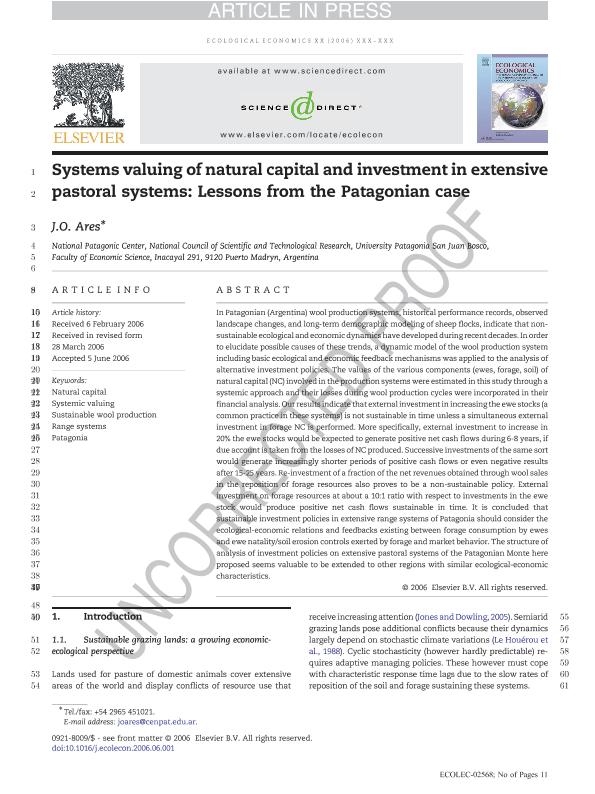Artículo
Systems valuing of natural capital and investment in extensive pastoral systems: Lessons from the Patagonian case
Fecha de publicación:
04/2007
Editorial:
Elsevier Science
Revista:
Ecological Economics
ISSN:
0921-8009
Idioma:
Inglés
Tipo de recurso:
Artículo publicado
Clasificación temática:
Resumen
In Patagonian (Argentina) wool production systems, historical performance records, observed landscape changes, and long-term demographic modeling of sheep flocks, indicate that non-sustainable ecological and economic dynamics have developed during recent decades. In order to elucidate possible causes of these trends, a dynamic model of the wool production system including basic ecological and economic feedback mechanisms was applied to the analysis of alternative investment policies. The values of the various components (ewes, forage, soil) of natural capital (NC) involved in the production systems were estimated in this study through a systemic approach and their losses during wool production cycles were incorporated in their financial analysis. Our results indicate that external investment in increasing the ewe stocks (a common practice in these systems) is not sustainable in time unless a simultaneous external investment in forage NC is performed. More specifically, external investment to increase in 20% the ewe stocks would be expected to generate positive net cash flows during 6-8 years, if due account is taken from the losses of NC produced. Successive investments of the same sort would generate increasingly shorter periods of positive cash flows or even negative results after 15-25 years. Re-investment of a fraction of the net revenues obtained through wool sales in the reposition of forage resources also proves to be a non-sustainable policy. External investment on forage resources at about a 10:1 ratio with respect to investments in the ewe stock would produce positive net cash flows sustainable in time. It is concluded that sustainable investment policies in extensive range systems of Patagonia should consider the ecological-economic relations and feedbacks existing between forage consumption by ewes and ewe natality/soil erosion controls exerted by forage and market behavior. The structure of analysis of investment policies on extensive pastoral systems of the Patagonian Monte here proposed seems valuable to be extended to other regions with similar ecological-economic characteristics.
Archivos asociados
Licencia
Identificadores
Colecciones
Articulos(CCT-CENPAT)
Articulos de CTRO.CIENTIFICO TECNOL.CONICET - CENPAT
Articulos de CTRO.CIENTIFICO TECNOL.CONICET - CENPAT
Citación
Ares, Jorge Oscar; Systems valuing of natural capital and investment in extensive pastoral systems: Lessons from the Patagonian case; Elsevier Science; Ecological Economics; 62; 1; 4-2007; 162-173
Compartir
Altmétricas




